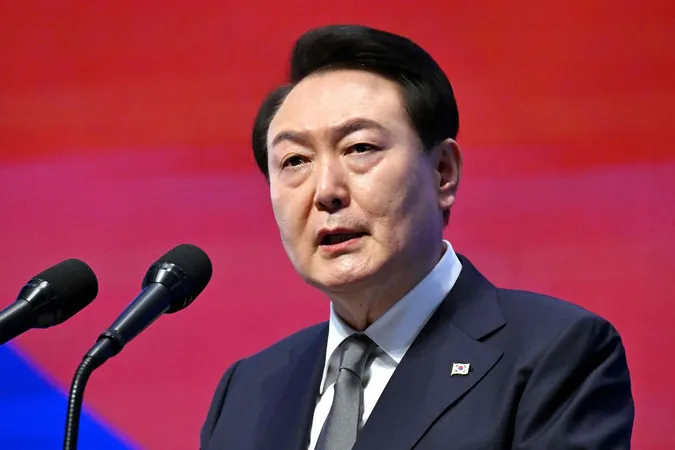
South Korea on High Alert: Investigators Warn of Legal Action Against Yoon Supporters as Tensions Rise
2025-01-01
Author: Sarah
In a shocking turn of events, South Korean investigators announced on January 1, 2024, that they are set to execute an arrest warrant for President Yoon Suk Yeol by the looming deadline of January 6. This comes as the embattled leader, who was impeached for declaring martial law, remains defiant and vows to resist arrest to the end.
President Yoon, having been suspended from office by Parliament over allegations of attempting to undermine civilian governance, has sparked a fervent response from both supporters and critics. His loyalists have gathered in large numbers outside his residence in Seoul, attempting to shield him from authorities seeking to question him. Tensions have reached a boiling point as the Corruption Investigation Office (CIO) prepares to move forward with legal action against the president, who has missed questioning sessions for the third time.
Yoon expressed his intentions in a contentious statement made to his supporters, declaring the nation to be under threat from "internal and external forces" and promising to fight alongside them. His rhetoric prompted a swift backlash, with opposition lawmaker Jo Seoung-lae condemning him as "delusional" and suggesting he aims to incite conflict.
CIO chief Oh Dong-woon reiterated that the arrest warrant will indeed be carried out within the established timeframe, while also indicating that law enforcement will be mobilized to maintain order. He warned that anyone obstructing the arrest could face prosecution, intensifying fears and speculation about potential violent clashes between police and Yoon's supporters.
The legal battle is further complicated by Yoon's team filing for an injunction against the arrest warrant, asserting it to be unlawful. As protests erupted outside the presidential compound, supporters donned elaborate costumes and rallied with placards, signaling a divided nation on the brink of chaos.
Yoon’s situation is particularly precarious given the severity of the charges against him, including potential life imprisonment or even the death penalty for insurrection. Upholding these charges would send shockwaves through the already tense political landscape.
The political drama doesn’t end there. Following Yoon's impeachment, the resignation of his remaining staff—including his chief advisor—marks a further descent into uncertainty. Acting President Choi Sang-mok rejected these resignations, calling for unity at a time of national crisis. In an act of defiance, those who resigned voiced their discontent over Choi's appointment of two new judges in Yoon's impeachment case, seen as a concession to opposition demands and questioned as an overreach of authority.
Yoon's declaration of martial law was met with immediate backlash, including a rapid parliamentary response that nullified the order, underscoring the fragility of governance in the face of such drastic measures. Armed troops even stormed the assembly in a chaotic display that has left many questioning the current administration’s stability.
As South Korea braced for further developments, the eyes of the nation are fixed on the Constitutional Court, which is set to deliver a ruling on the legitimacy of Yoon's impeachment. In this climate of uncertainty and unrest, one question looms over the country: What will happen when the deadline hits, and will the foundation of South Korean democracy be able to withstand the pressure of this political storm? Stay tuned as the situation unfolds.



 Brasil (PT)
Brasil (PT)
 Canada (EN)
Canada (EN)
 Chile (ES)
Chile (ES)
 Česko (CS)
Česko (CS)
 대한민국 (KO)
대한민국 (KO)
 España (ES)
España (ES)
 France (FR)
France (FR)
 Hong Kong (EN)
Hong Kong (EN)
 Italia (IT)
Italia (IT)
 日本 (JA)
日本 (JA)
 Magyarország (HU)
Magyarország (HU)
 Norge (NO)
Norge (NO)
 Polska (PL)
Polska (PL)
 Schweiz (DE)
Schweiz (DE)
 Singapore (EN)
Singapore (EN)
 Sverige (SV)
Sverige (SV)
 Suomi (FI)
Suomi (FI)
 Türkiye (TR)
Türkiye (TR)
 الإمارات العربية المتحدة (AR)
الإمارات العربية المتحدة (AR)